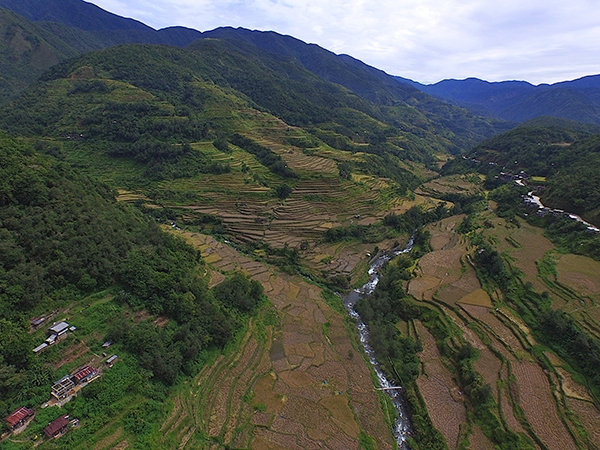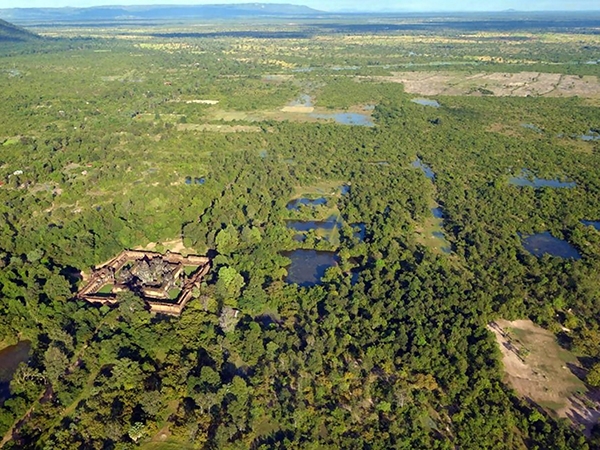Stephen Acabado to Direct PEMSEA, Established by a Luce Grant of $740,000

The Henry Luce Foundation awarded a grant of $740,000 to the UCLA Center for Southeast Asian Studies to support the project Early Modern Period Transitions in Southeast Asia: Environmental Dynamics, Social Change, and Globalization, which was described as “an exciting project” by Helena Kolenda, the Program Director for Asia at the Luce Foundation. The grant was awarded through the Luce Initiative on Southeast Asia and will establish the Program for Early Modern Southeast Asia (PEMSEA), directed by Stephen Acabado, associate professor of anthropology and core faculty member of the Cotsen Institute of Archaeology. Acabado will also serve as director of the Center for Southeast Asian Studies effective July 1, 2021, the official beginning date of the project, which will run through June 30, 2027. Various UCLA units will also contribute approximately $1.4 million to the program, including the International Institute, Cotsen Institute of Archaeology, the Dean of Humanities, and the Dean of Social Sciences, according to Acabado.
 With the University of Hawai‘i–Mānoa and the University of Washington as collaborators, PEMSEA is designed to be an interdisciplinary research program to expand and revitalize Southeast Asian studies by offering new directions for integrated scholarship through undergraduate and graduate student training, annual interdisciplinary workshops and field schools, community engagement, and logistical support for studies on Early Modern Period Southeast Asia. The research program intends to provide baseline environmental histories from different locations in Southeast Asia using multidisciplinary approaches.
With the University of Hawai‘i–Mānoa and the University of Washington as collaborators, PEMSEA is designed to be an interdisciplinary research program to expand and revitalize Southeast Asian studies by offering new directions for integrated scholarship through undergraduate and graduate student training, annual interdisciplinary workshops and field schools, community engagement, and logistical support for studies on Early Modern Period Southeast Asia. The research program intends to provide baseline environmental histories from different locations in Southeast Asia using multidisciplinary approaches.
“We are using both the Luce and UCLA funds to help increase the participation and training of underrepresented minorities in Southeast Asian archaeology and archaeology in general,” Acabado said. “Right now, we are looking at eight undergraduate and four graduate students every year for the next five years participating in the field schools. We also want to open it to highly deserving students who are not part of the consortium. Since there are a very limited number of graduate students working in Southeast Asian archaeology, we will open it to other universities. There will also be a competition for grants for student research funds in Southeast Asia, not only for American students, but also for Southeast Asian undergraduate and graduate students, as well as senior colleagues who want to start working in Southeast Asia,” Acabado explained.
“We want to break that barrier for students who are unable to pay for field schools,” he continued. “We do not expect students to specialize in Southeast Asian studies. We want them to have this formative field experience to apply to whatever advanced degrees they want to pursue. We are bringing in early career Southeast Asians from different Southeast Asian countries to participate in the field schools. So, we will have early career archaeologists and historians from Southeast Asia.” Initial field schools are scheduled for the Philippines next year and possibly Cambodia. “We are also scheduled to run field schools in Thailand and Indonesia,” according to Acabado.
 “I am thrilled that this grant from the Luce Foundation will enable PEMSEA to advance the field of Southeast Asian Studies in critical and innovative ways through integrated and community-engaged scholarship on the social, economic, and environmental transformations of the region during this period,” extolled Cindy Fan, UCLA vice provost for international studies and global engagement. “The UCLA International Institute will support the field schools in Southeast Asia organized by PEMSEA over the next six years as part of our mission to expand opportunities for students to receive an enriching international experience to enhance their education and training in becoming future global citizens and leaders,” she concluded.
“I am thrilled that this grant from the Luce Foundation will enable PEMSEA to advance the field of Southeast Asian Studies in critical and innovative ways through integrated and community-engaged scholarship on the social, economic, and environmental transformations of the region during this period,” extolled Cindy Fan, UCLA vice provost for international studies and global engagement. “The UCLA International Institute will support the field schools in Southeast Asia organized by PEMSEA over the next six years as part of our mission to expand opportunities for students to receive an enriching international experience to enhance their education and training in becoming future global citizens and leaders,” she concluded.
As described by Acabado, “the Early Modern Period is a global historical period, but in Southeast Asia it is where you have intensification of maritime trade starting about 1400, characterized by the arrival of Europeans and maritime trade with South Asia, East Asia, and China. Because of our bottom up approach, PEMSEA wants to help facilitate decolonizing archaeological and historical research in Southeast Asia, moving away from the European models in explaining culture change in the region. We have been using the three-age system: Stone Age, Bronze Age, Iron Age, which is really not applicable to Southeast Asian realities. We want to establish a regional chronology based on Southeast Asian experiences, rather than using Eurocentric models.”
“Luce funding for PEMSEA supports transdisciplinary research on a poorly-known historical period when Southeast Asia became a focal node of the emergent world system,” explained Miriam T. Stark of the department of anthropology at the University of Hawai‘i–Mānoa. “Studying human-environment dynamics in Early Modern Southeast Asia not only offers global insights on long-term human responses to climatic variability, it also builds local histories using documentary, archaeological, and environmental approaches,” she added.
“I am delighted that the Luce Foundation has chosen to invest in the PEMSEA project, which will bring together archaeologists, historians, and climate scientists from the United States and Southeast Asia,” according to Peter Lape of the department of anthropology and the Burke Museum at the University of Washington. “The Early Modern Period was one of dramatic changes in society and environment that holds lessons incredibly relevant to our current time of transformation,” he explained.
The first activity of PEMSEA will happen in August, 2021, when “we are running a series of virtual workshops, co-sponsored by our Asia-based partners, Partido State University, the Polytechnic University of the Philippines, and the Center for Taiwan-Philippines Indigenous Knowledge, Local Knowledge, and Sustainable Studies at the National Chengchi University. We are bringing in some key collaborators to work with local Philippine colleagues. Right now, we have eight panels, but we are hoping to make it ten. It will be on-line as a webinar series,” Acabado noted.
Born in the Philippines, Acabado received his PhD in Hawai‘i, then spent three years in Guam. He came to UCLA in 2013 and continued his work in the Philippines. Three years ago, he also started work in Taiwan. In addition to his duties as director of the Center for Southeast Asian Studies and PEMSEA, he will continue teaching two courses.
The Henry Luce Foundation seeks to enrich public discourse by promoting innovative scholarship, cultivating new leaders, and fostering international understanding. Established in 1936 by Henry R. Luce, the co-founder and editor-in-chief of Time, Inc., the Foundation advances its mission through grantmaking and leadership programs in the fields of Asia, higher education, religion and theology, art, and public policy. In keeping with its mission, the Asia Program of the Luce Foundation works to strengthen and support the generation of knowledge, expertise, capacity and resources on Asia- for scholars, policymakers and publics; to increase understanding and build trust among Americans and the peoples of Asia in order to promote peace; and to counter Asia-related xenophobia and racism in the United States. The Luce Initiative on Southeast Asia (LuceSEA), administered by the Asia Program, is a multi-year grants competition approved by the Foundation’s Directors in June 2018.
To learn how to support our research and education in archaeology and conservation, or for more information, please contact Michelle Jacobson at mjacobson@ioa.ucla.edu.
--
Figure 1. Stephen Acabado
Figure 2. Hapao Rice Terraces, Ifugao, Philippines. Acabado’s work has established that these terraces were constructed around 300–400 years ago as a response to the arrival of the Spanish in the Philippine lowlands.
Figure 3. Angkor Wat, Siem Reap, Cambodia. Angkor Wat represents the apex of the Angkorian Kingdom, which collapsed when Southeast Asia entered the Early Modern Period.
Published on June 30, 2021.


